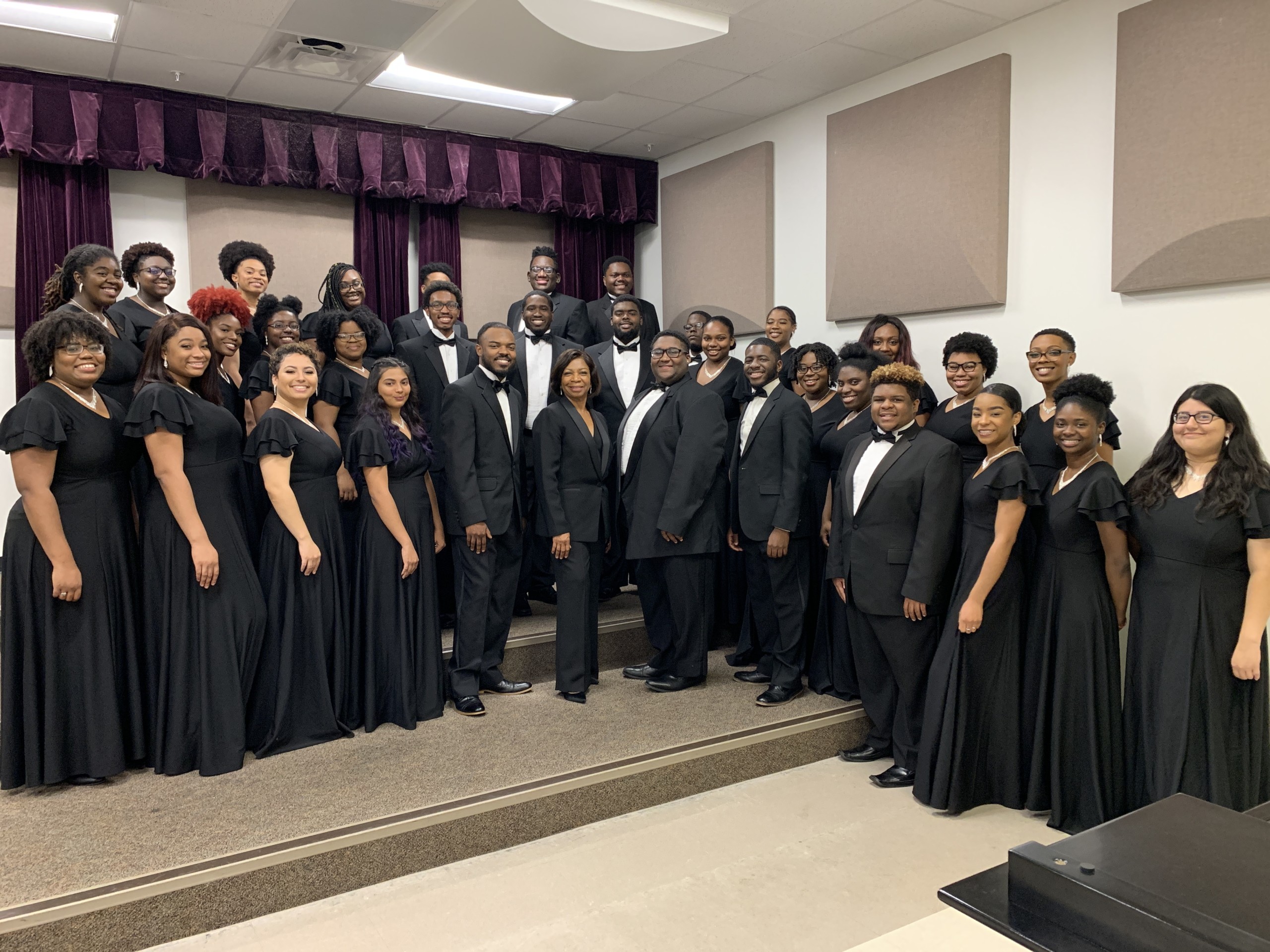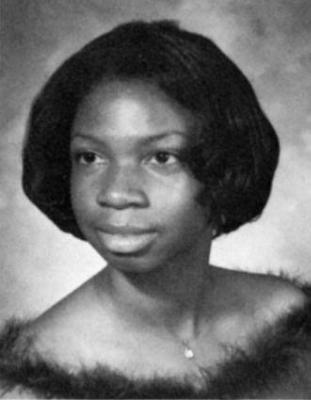
HSPVA senior photo.
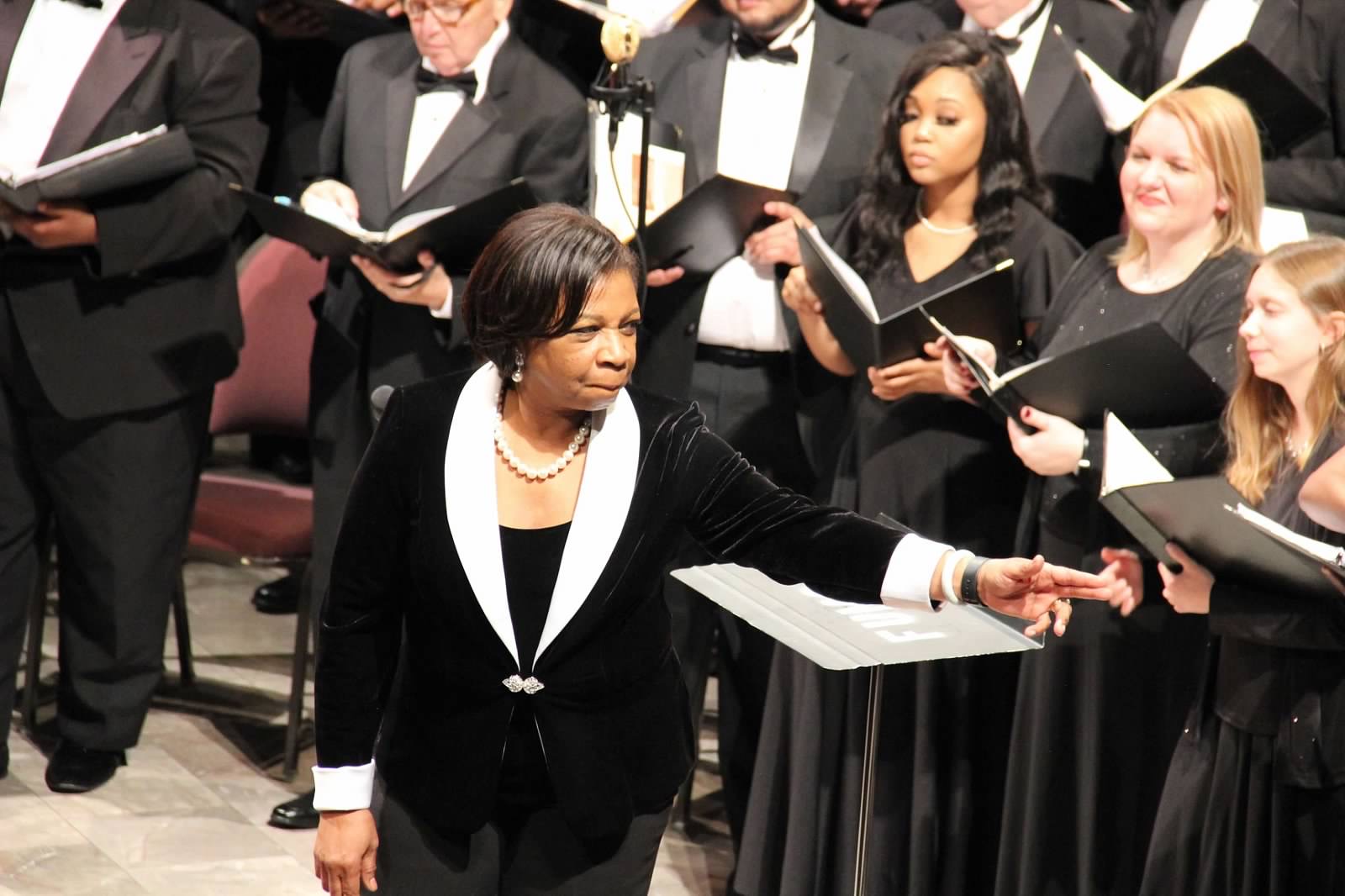
Conducting at the February 2020 “Gospel Spirit” concert featuring the Houston Choral Society and the Prairie View A&M University Concert Chorale. Photos courtesy of Dr. Taylor.
This year’s back-to-school season marks the end of Dr. A. Jan Taylor’s (Vocal ‘75) first year of retirement. Last summer, after 39 years of teaching, she celebrated an illustrious 26-year career as Prairie View A&M University’s Director of Choral Music Activities. But before she became the beloved educator, pianist, singer, and award-winning choral conductor she is today, she was known by her peers as Jan Green. Her father was a postman. Her mother, Mrs. Willia Ida Green, was an HISD elementary school teacher who had dreams of becoming either a musician or a photographer. In an interesting turn of events, her two children later obtained those same professions for themselves. With Mrs. Green as her first piano teacher, Jan eventually became the musician. Jan’s younger brother became the photographer.
Dr. Taylor grew up in Houston’s Third Ward on the heels of the Civil Rights Movement. When she was a student at G.B.M. Turner Elementary, most schools in the city were still segregated. She remembers being taught to read and sing choral music by numbers rather than by solfege (think “Do-re-mi” and that catchy song from The Sound of Music). By the time she got to Lanier Middle School, it was one of the schools that was just beginning to integrate. “My class was maybe the second wave of Black students to attend and, even then, there were still probably less than 50,” she recalls. “We didn’t have eruptions and such, save the TSU riots that year.” Although Houston schools integrated slowly and quietly, the culture shock was still inevitable—slow and quiet.
Though Lanier’s student body was still majority white at the time, the mixture of other ethnicities was significant enough to foster what Taylor called an “experience in culture.” It also helped solidify in her mind what a Mercedes Benz was and, perhaps, what it meant to have one. She noticed that “a lot of the parents were picking up their kids in Mercedes” or having their nannies do the picking up for them. Still, she sensed that the uncertainty caused by the integration process stemmed more from the school’s teachers and administration than her classmates. Though she felt welcomed by some, she also felt as though “some teachers didn’t think that we belonged there, or that we were even capable of learning in the same way that the white kids did.” When HSPVA joined the integration conversation as a new “voluntarily desegregated school” the energy was a little different.
When Jan Green (Taylor) and her best friend at the time, Stephanie Dory, walked into their first HSPVA audition in 1972, it was the second year the school had ever held auditions. Of the two girls–who both sang in choir at Lanier–only one of them actually had intentions to be an HSPVA vocal student: Dory. Green served as her piano accompanist. After all, Green had already auditioned to be Lamar High School’s choir accompanist. She had her mind set on attending there in the fall. However, Jean Galloway (PVA’s first choir director) advised her to prepare her own audition piece. So, she did. It didn’t matter that the school had no formal piano department yet; they had Jean Galloway and Patricia Bonner. She says,
“I had never seen women who could handle choirs, who knew so much about choir, how to teach choral tone, knew so much about repertoire, and then who were so much fun, and who were so caring about the students.”
Her previous music teachers–Vivian Harrison at Turner Elementary and Gloria Gee at MacGregor Elementary–were instrumental to her musical journey, but seeing Ms. Galloway and Ms. Bonner in action is what ultimately steered her career towards choir directing and away from performing as a concert pianist. She didn’t stop playing piano though. At that time, PVA’s pianists primarily accompanied the vocal ensembles or were selected for the jazz and instrumental groups.
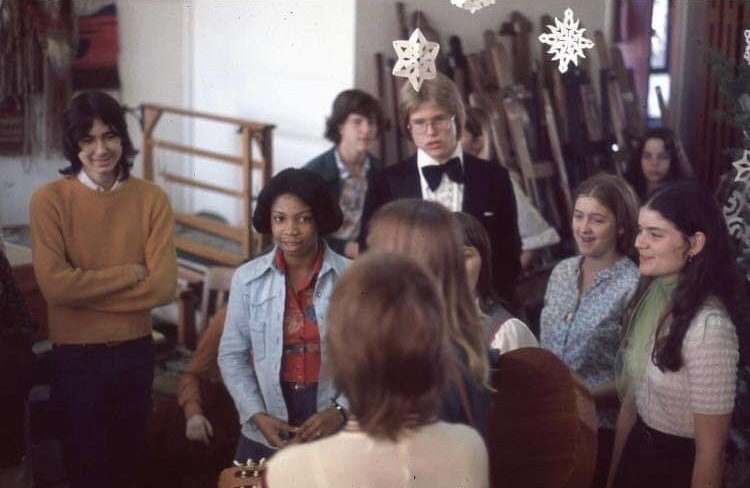
With friends during her junior year at PVA (circa 1974). Photo courtesy of Dr. Taylor.
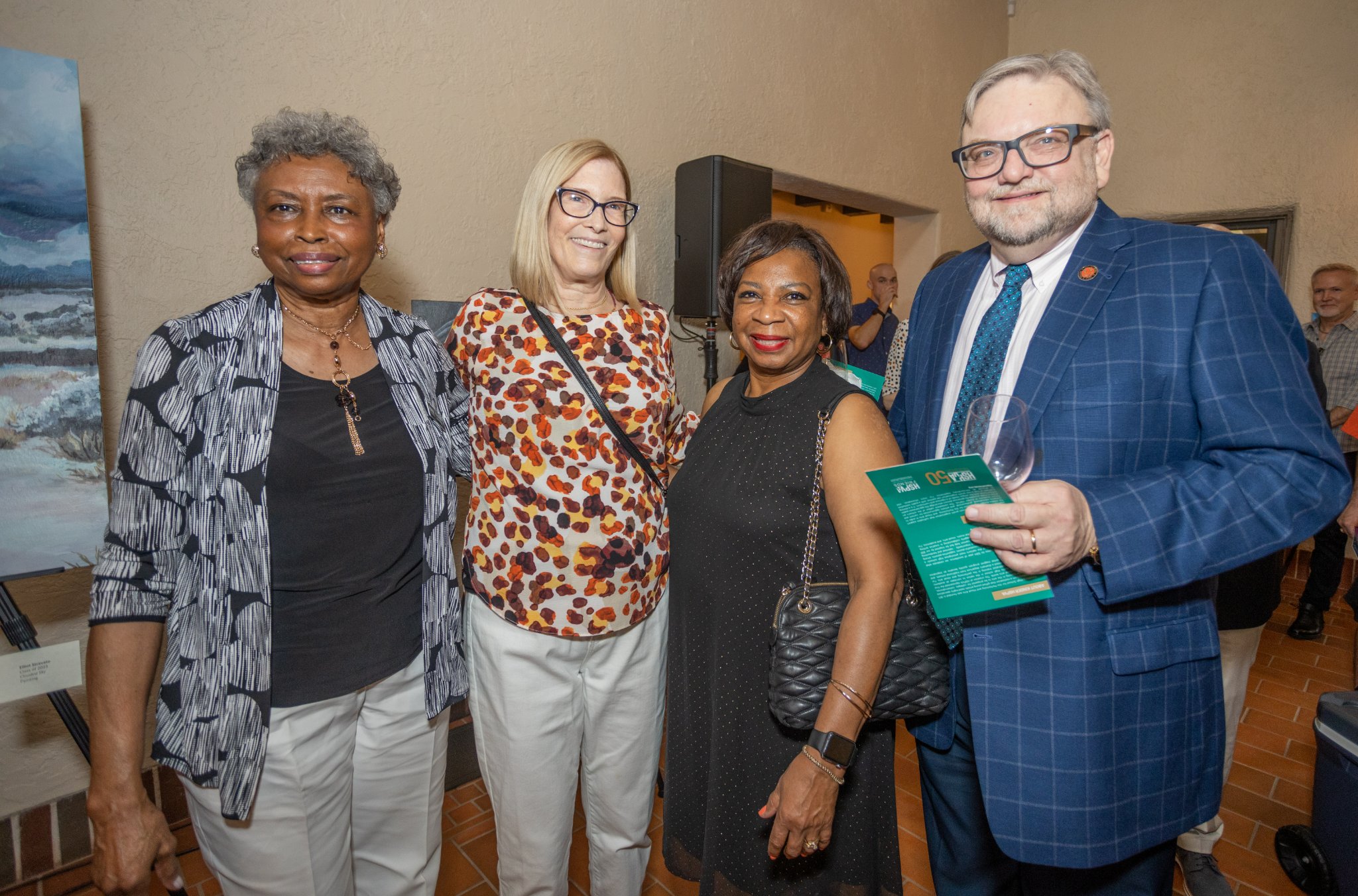
Patricia Bonner and Carole Nelson (retired HSPVA Vocal instructors), Dr. Taylor, and fellow ‘75 Vocal alum David Whorton at last year’s “Encore50” event celebrating the school’s 50th Anniversary. Photo by Kathy Anderson.
The year she started classes at PVA and “got the bug” for choral directing was the same year she met her earliest musical mentor: Dr. Clyde Owen Jackson. He and Dory, Taylor’s friend from Lanier, were both members at Wheeler Avenue Baptist Church. The church, known for its stellar performances of spirituals as well as major sacred works like Vivaldi’s “Gloria” and Handel’s “Messiah,” had a sizable population of young adults. To accommodate, the reverend’s wife suggested that Jackson form a new youth choir. Knowing that Jackson could use a young accompanist like Jan in the group, Dory introduced the two. Thanks to her, Taylor spent the next 22 years at Wheeler Avenue, accompanying and occasionally directing their choirs. Thanks to Jackson, a lot of the choral repertoire Taylor knows now, she learned before even getting to college.
Like Taylor’s father and like many other respectable Black men at the time, Jackson was a postman by occupation. Unlike most, he was also a composer, choir conductor, journalist, newspaper editor, author, and community activist. “A pioneer and a trailblazer in everything that he did,” Taylor adds. By the end of his 89 years of life, he had become the first Black postmaster of his hometown of Galveston, established the Houston Post Office Chorale, authored eight books, and earned degrees from both the Tuskegee Institute (now University) and Texas Southern University. At Tuskegee, Jackson sang in the legendary Tuskegee Institute Choir under William L. Dawson’s direction and soon became the composer’s “personal assistant and devoted disciple.” Dawson specialized in arranging spirituals and other Black religious folk music for choirs and other types of ensembles. According to Taylor, Jackson was “very close to the source in that he knew exactly the performance practices and conventions of those types of pieces.” “He heard from William Dawson himself how these pieces were to be performed, and so he in turn passed it on to me,” she says, “which I continue to pass on throughout my teaching with students and seminars and lectures and such that I give.” Whenever she tried to thank her mentor for his role in her life and professional work, he always used to tell her,
“Just pass it along, daughter.”
So, that’s what she’s been doing.
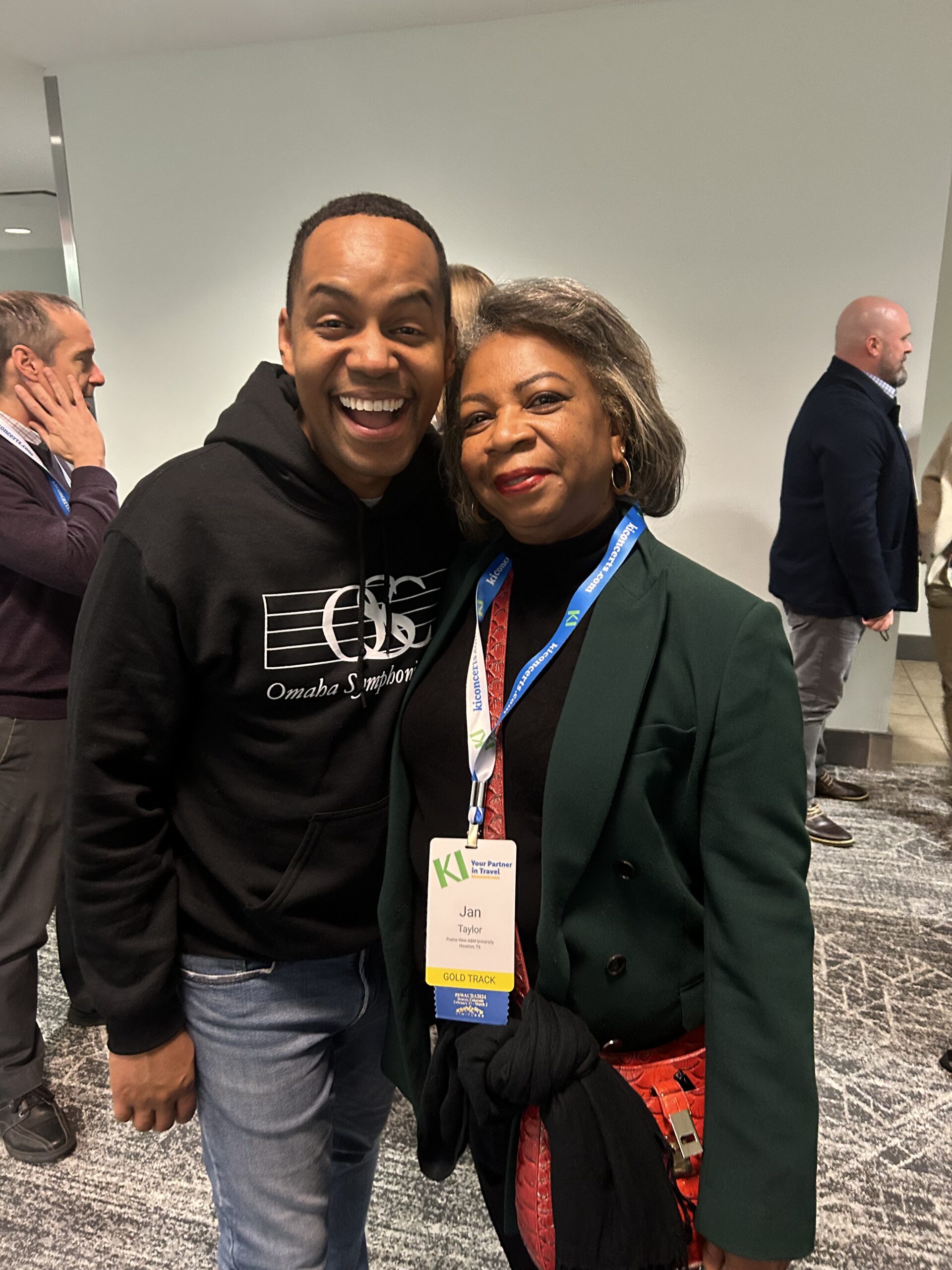
With Marques L.A. Garrett, composer.
As a lecturer on Negro spirituals, Dr. Taylor works to preserve the music and pass on its legacy through her speaking engagements, academic writing, and choral clinician work. As the director of Prairie View’s choir program, Dr. Taylor served with passion and made it her mission to expose her students and audiences to music by “non idiomatic Black choral conductors or composers,” a term she says was coined by her friend and composer, Marques L.A. Garrett. Under her direction, the PV Singers and Concert Chorale have performed at several notable concerts, conventions, and festivals both statewide and abroad.
Following in the footsteps of Ms. Galloway and Ms. Bonner, Taylor earned her Bachelor of Music degree in Vocal Music Education from the University of Houston. Shortly thereafter, she got married and started pursuing her master’s degree at Prairie View (PV). She had considered going to school in Atlanta but, due to the economic downturn caused by the late 70s/early 80s oil crisis, it seemed everyone was trying to make their way to Texas. After PV, she returned to U of H for her Doctor of Musical Arts degree in Choral Conducting. “I always knew I wanted to have a doctorate degree, and U of H had a great program. It made sense, it was right here in the city, and I didn’t have to leave and go anywhere else for a great program.”
“It was favor, I guess, in that all those things lined up at just the right time and in the right place for me.”
For the first 13 years of her professional teaching career, she taught at various music programs within HISD, in search of the right place for the time. Though most of the time was spent at Johnston Middle School (now Meyerland PVA), Lamar High School–her last HISD post–had potential to be the school from which she would retire. During those early years, she also worked with local organizations like Singing Boys of Houston (now Houston Boychoir) and the Houston Ebony Opera Guild. Later, at concert halls like The Kennedy Center in New York and Nashville’s Grand Ole Opry House, she conducted multiple performances by the 105 Voices of History Choir, comprised of students from our country’s 105 historically Black colleges and universities (HBCUs).
Since Taylor is a degree holder from both a predominantly white institution (PWI) and an HBCU, I wondered how those experiences differed for her. At U of H, she enjoyed studying under Charles Hausman and learning the art of conducting, but says PV provided a uniquely “nurturing environment,” something that has drawn Black students to HBCUs for over a century. During the Reconstruction Era, when most HBCUs were established, their primary purpose was to provide higher learning institutions for emancipated slaves. As a masters student, Taylor considered PV a “safe place to receive a high quality education without the burdens of racism.”
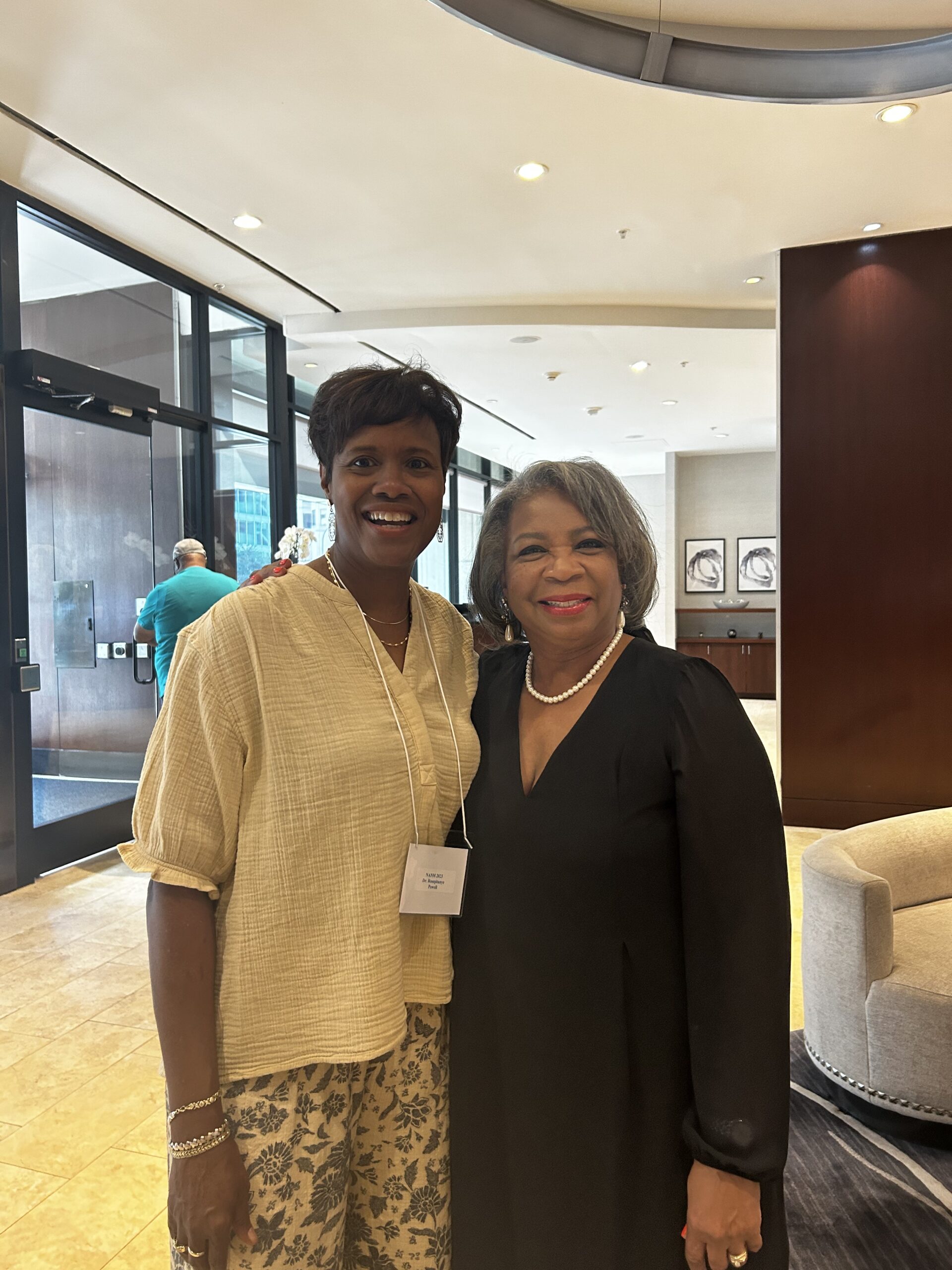
With Rosephanye Powell, composer.
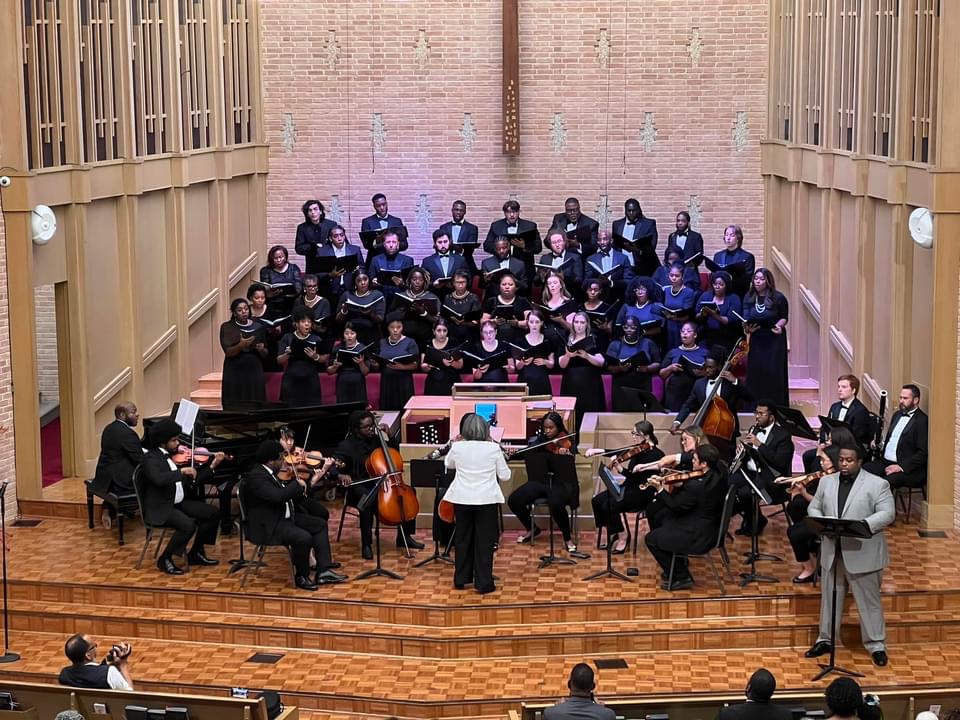
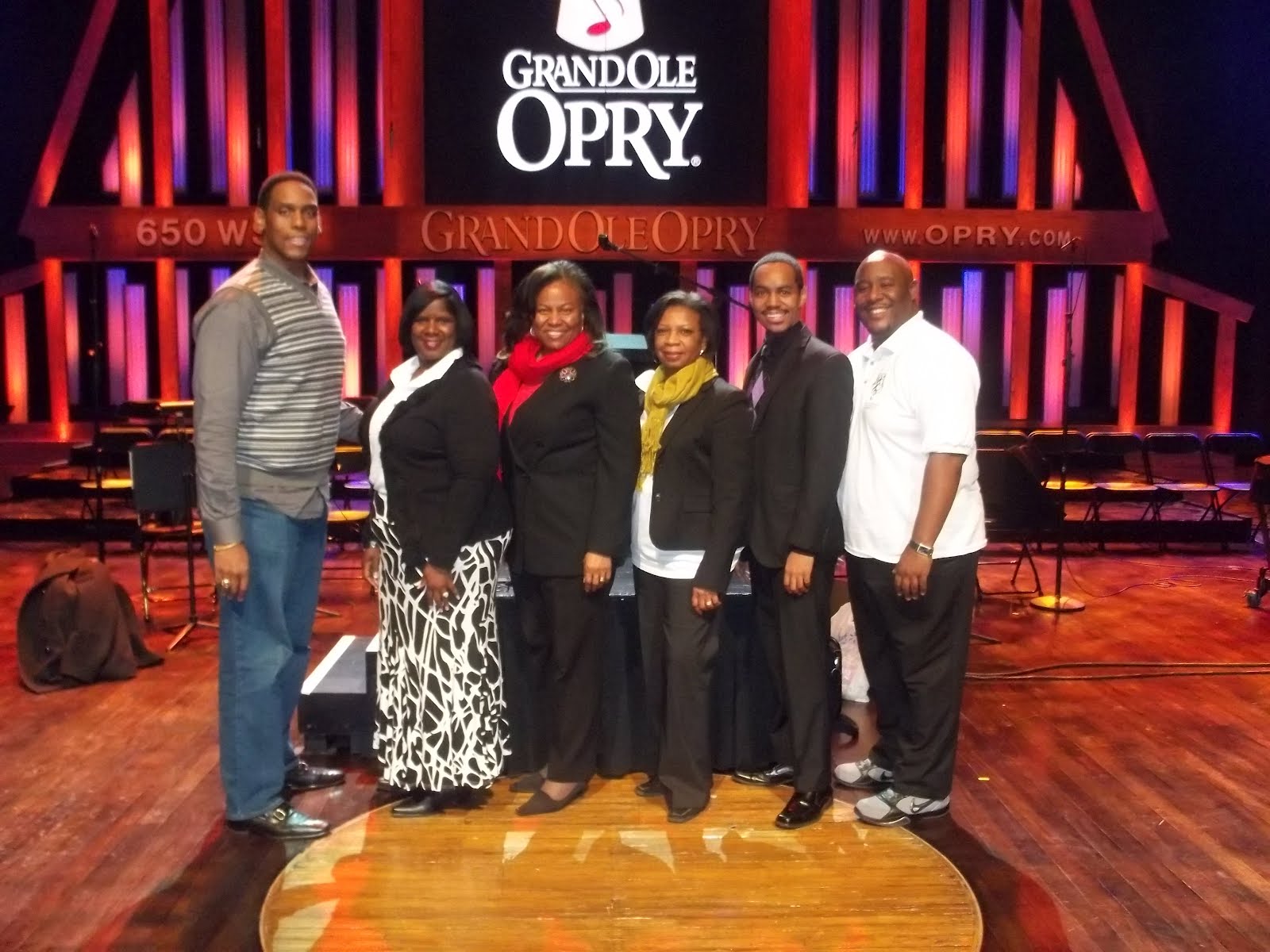
As a PV professor and as founding member of the Lambda Zeta chapter of Sigma Alpha Iota, a music fraternity for women, Taylor played an integral role in creating that nurturing experience for her students and continues to mentor and empower many of her former students today. “It’s very rewarding, it’s very gratifying, and it’s very inspiring to see what young Black musicians are out doing these days and what they aspire to do,” she says. When people remark that her replacement will have hard shoes to fill, she often says, “I have walked away with my shoes and whoever comes next will have an opportunity to make that program their own.”Reflecting on her tenure, the most challenging part wasn’t what she calls the dreaded “year of computer choir.” It was staying on top of everything and finding balance.
“There’s more to it than just standing in front of the choir and rehearsing and performing. There’s the administrative aspect of it, there is the bringing together of individuals and teaching them how to work together as an ensemble, as a community.”
“It’s juggling other subjects that you teach. It’s juggling family life.” When Dr. Taylor started pursuing her masters degree, she and her husband were already married with one child and another on the way. Somehow, perhaps with her parents as a blueprint, she made a way out of no way and found the time when it seemed there was no time. “Creativity and performing, that life is not a nine to five,” she says, “it’s constant.”
Since retiring from her collegiate position, Dr. Taylor has been named a recipient of the Texas Choral Directors Association’s prestigious Texas Choir Master Award and also been honored with a two-day tribute produced by the Community Artists’ Collective and Community Music Center of Houston as part of their Annual Legacy Project. In addition to the solo pieces performed by some of her former students, she particularly enjoyed the choral selections performed by Voices of Houston, a new vocal ensemble in the city. HSPVA alumna Cecily Gordon (Vocal ‘10) sings soprano in the group. Being recognized in this way by her peers, friends, and former students was both overwhelming and “very, very moving,” Taylor says. She couldn’t help thinking, “Did I really make that much of a contribution?”
To contribute to the well of wisdom BAN has been working to build for future generations of artists and professionals, Dr. Taylor offers this advice: “If you are an artist or a creative, you must practice and not take it for granted that just because you have this particular talent that the world is going to come searching for you. Practice, study, be prepared for whatever comes along. Prepare for college.
“Whatever area you pursue, practice, study, be prepared.”
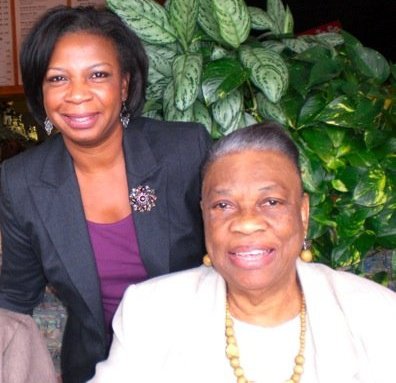
With her mother, a long-time HISD educator.
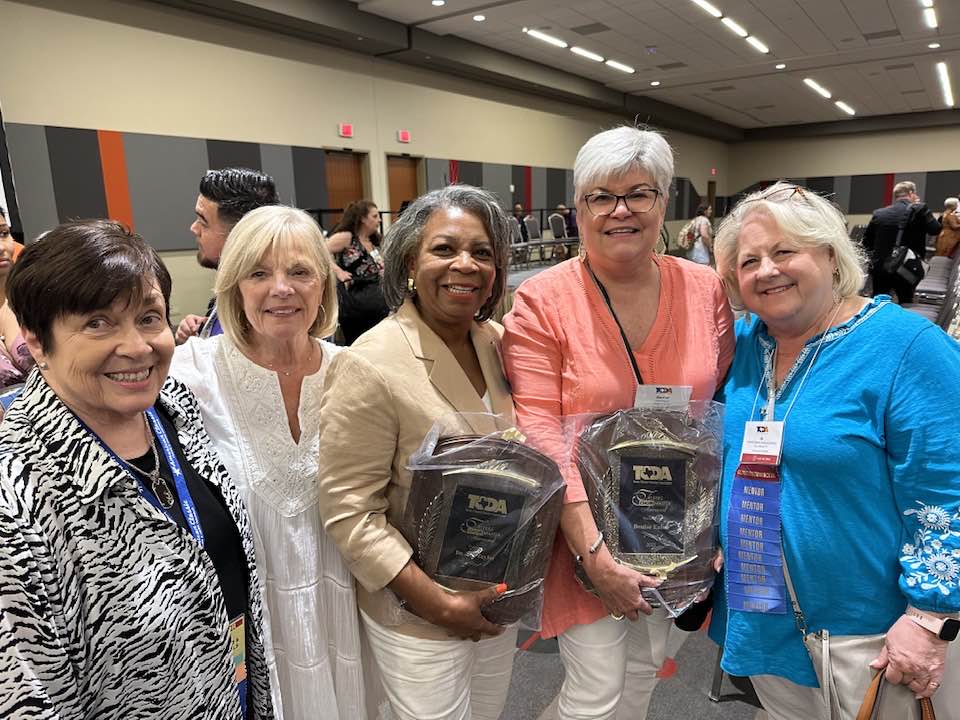
Dr. Taylor and Denise Eaton, recipients of the 2023 Texas Choir Master Award.
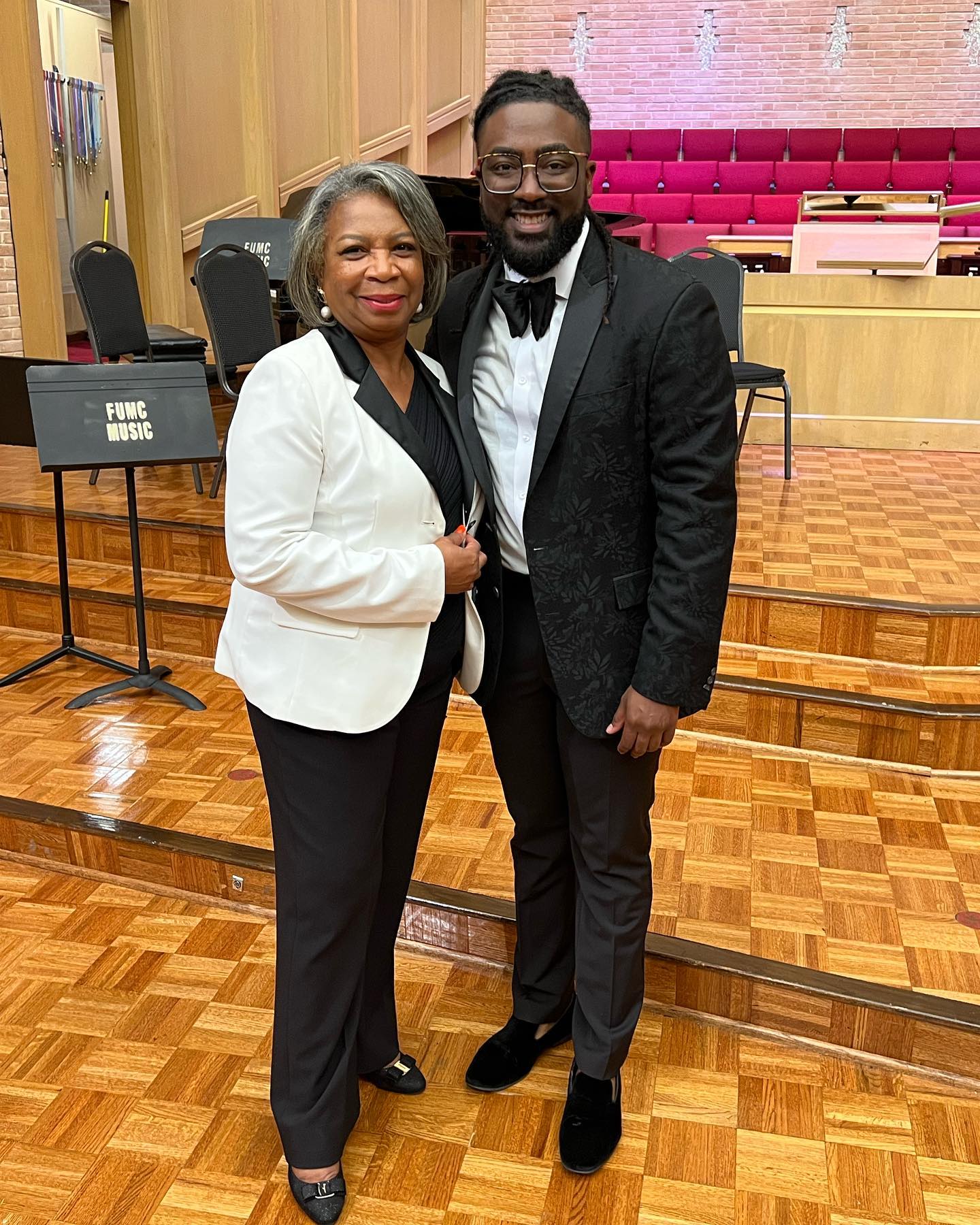
With Vinroy D. Brown, Jr., conductor of the Westminster Choir College Jubilee Singers.
